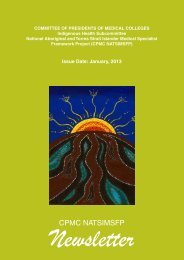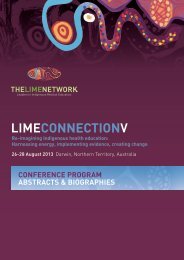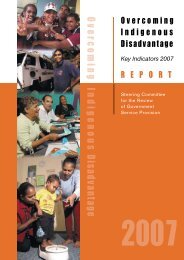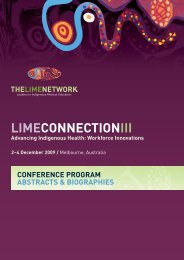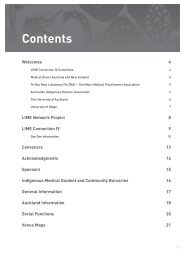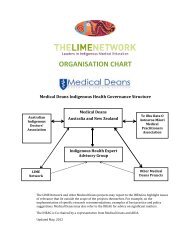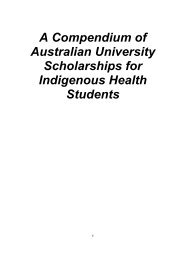View - LIME Network
View - LIME Network
View - LIME Network
Create successful ePaper yourself
Turn your PDF publications into a flip-book with our unique Google optimized e-Paper software.
GuidelinesThe Royal Australian and New Zealand College of Psychiatrists has prepared the principles andguidelines below to help psychiatrists and psychiatric trainees work constructively and effectively withthe Aboriginal and Torres Strait Islander people and their communities and organisations.1. For a health professional to allow stereotyping and prejudice to influence thinking about orbehaviour towards individuals and communities is a serious breach of ethical and practicestandards.2. Participation, partnership, respect, negotiation and a willingness to learn are the pathspsychiatrists should follow if they are going to make a useful contribution to the mental health ofAboriginal and Torres Strait Islander people.3. The College recognises that optimal mental health care and access to appropriate mental healthservices is a right of all Australians.4. The College requires that mental health services and private psychiatrists should always respectthe dignity and human rights of those who seek or require help with mental health or social andemotional problems.5. The College recognises that there is a broader understanding of mental health within indigenouscommunities. This involves a holistic construction of social, emotional, cultural and spiritualwellbeing.6. The College is firmly committed to the principle that Aboriginal and Torres Strait Islander peopleare entitled to effective mental health care which is appropriate to their culture and needs.7. The College believes that negotiation, consultation, participation and partnership should be thebasis on which psychiatrists and psychiatric trainees assist with mental health services forAboriginal and Torres Strait Islander people and communities.8. The College recognises that the asymmetry of power is often amplified in interactions betweenmental health professionals and Indigenous Australians. Effective and empathic communicationbetween non-Indigenous professionals and Aboriginal and Torres Strait Islander clients mayrequire special effort and resources. Psychiatrists should be aware of and acknowledge their owncultural assumptions, respectful of the client and the client's culture and learn about those localfactors (historical, contextual and behavioural) which support effective and empathiccommunication.Ethical Guideline 11 – Principles and Guidelines for Aboriginal and Torres Strait Islander Mental HealthPage 2 of 5



